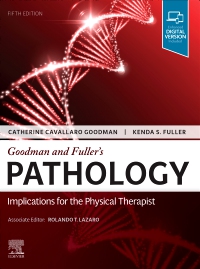
Goodman and Fuller’s Pathology - Elsevier eBook on VitalSource, 5th Edition
Elsevier eBook on VitalSource

Now $119.69
**Selected for Doody’s Core Titles® 2024 in Physical Therapy**
The only pathology textbook written specifically for physical therapy, this edition continues to provide practical and easy access to information on specific diseases and conditions as they relate to physical therapy practice. Coverage includes guidelines, precautions, and contraindications for interventions with patients who have musculoskeletal or neuromuscular problems, as well as other medical conditions such as diabetes or heart disease. Logically organized content offers at-a-glance access to essential information on common illnesses, diseases, adverse drug effects, organ transplantation, laboratory values, and more to ensure the most reliable and effective physical therapy for patients.
-
- Up-to-date coverage with contributions from more than 100 content experts in pathology and physical therapy
- Revised content throughout provides the most current information required to be an effective practitioner
- Full-color interior design, photos, and illustrations visually reinforce key concepts
- A Therapist's Thoughts offers personal and clinical insights from experienced therapists specializing in cancer, diabetes, cystic fibrosis, women’s health, lymphedema, psychological problems, and much more
- Special Implications for the Therapist boxes provide information and ideas to consider when formulating a plan of care that addresses precautions, contraindications, and best practice specific to physical therapy
- Current information on conditions, medical testing and treatment, and practice models keeps students up to date on the latest research findings and recent changes in the field
- Key information presented in an at-a-glance format is organized by body system for easy reference
- Basic science information addresses the clinical implications of disease within the rehabilitation process, covering common illnesses and diseases, adverse effects of drugs, organ transplantation, laboratory values, and much more
- Coverage includes updated information on standard precautions
- Separate chapter addresses laboratory tests and values that are important in physical therapy practice
- Separate appendix provides guidelines for activity and exercise
- A focus on health promotion and disease prevention is featured throughout the text
-
- NEW! Enhanced eBook version is included with print purchase, which allows students to access all of the text, figures, and references from the book on a variety of devices
- NEW! Completely reconfigured introductory chapters recognize how much physical consequences of trauma, social isolation, and psychiatric disorders affect recovery from pathology, and how integration of self-regulation into intervention is key to the future of practice
- NEW! Expanded content on the role of epigenetics in optimizing exercise-based interventions (a concept referred to as "precision physical therapy") addresses its increasing importance in physical rehabilitation management as it relates to pathology, individual diseases, risk factors, and patient responses to physical therapy interventions
- NEW! Coverage of the latest discoveries and findings in the science of quantum physics, mind-body connection, and consciousness-based energy medicine
- NEW! Information on genomics and regenerative medicine as they relate to physical therapy practice
- NEW! Helpful references and additional boxes/tables are available in the eBook
- UPDATED! Evidence-based content with more than 7,000 references ensures content is current and applicable for today’s physical therapists and physical therapist students
-
SECTION I: INTRODUCTION
1. Introduction to Concepts of Pathology
2. Epigenetics: Behavioral, Social, and Environmental Factors
3. Physiologic Self-Regulation: The Intersection with Mental, Social, and Emotional Well-Being
4. Environmental and Occupational Medicine
5. Problems Affecting Multiple Systems
6. Injury, Inflammation, Healing, and Repair
SECTION II: CLINICAL MEDICINE
7. The Immune System
8. Infectious Disease
9. Oncology
10. The Integumentary System
11. The Endocrine and Metabolic Systems
12. The Cardiovascular System
13. The Lymphatic System
14. The Hematologic System
15. The Respiratory System
16. The Gastrointestinal System
17. The Hepatic, Pancreatic, and Biliary Systems
18. The Renal and Urologic Systems
19. The Male Genital/Reproductive System
20. The Female Genital/Reproductive System
21. Transplantation
SECTION III: PATHOLOGY OF THE MUSCULOSKELETAL SYSTEM
22. Introduction to Pathology of the Musculoskeletal System
23. Genetic and Developmental Disorders
24. Metabolic Disorders
25. Infectious Diseases of the Musculoskeletal System
26. Musculoskeletal Neoplasms
27. Soft Tissue, Joint and Bone Disorders
SECTION IV: PATHOLOGY OF THE NERVOUS SYSTEM
28. Introduction to Central Nervous System Disorders
29. Infectious Disorders of the Central Nervous System
30. Central Nervous System Neoplasms
31. Degenerative Diseases of the Central Nervous System
32. Stroke
33. Traumatic Brain Injury
34. Traumatic Spinal Cord Injury
35. Cerebral Palsy
36. Epilepsy
37. Headache
38. Vestibular Disorders
39. The Peripheral Nervous System
SECTION V: IMPORTANT RESOURCES
40. Laboratory Tests and Values
Appendix A: Guidelines for Activity and Exercise


 as described in our
as described in our 